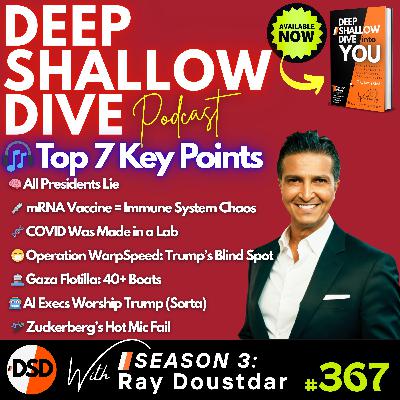Discover Deep Shallow Dive
Deep Shallow Dive

Deep Shallow Dive
Author: Ray Doustdar
Subscribed: 15Played: 639Subscribe
Share
© Ray Doustdar
Description
It's time to 'Call a Spade a Spade.' In each episode of 'Deep Shallow Dive,' I break down past and present events, revealing how narratives and distractions create a sense of division. Together, we'll pull back the curtain to uncover the truth and find that we're not as divided as we might think. We will do this through the Lens of Common Sense and our Defining DSD Pillars of Self-Awareness, Resilience, Authenticity, and Empathy.
We go DEEP enough to get the truth—SHALLOW enough to keep it sane. This is Deep Shallow Dive. Let's DIVE in. Ok, Let's Go.
We go DEEP enough to get the truth—SHALLOW enough to keep it sane. This is Deep Shallow Dive. Let's DIVE in. Ok, Let's Go.
385 Episodes
Reverse
🎙️ EP#384 | GUEST | Question Everything: Jeb Baugh on Glenn Beck, Gen Z, and the Great AwakeningFreshman firebrand Jeb Baugh joins Ray for a bold, rapid-fire ride through generational politics, the military-industrial complex, and America’s foreign entanglements. At just 19, Jeb became a viral name after publicly confronting Glenn Beck at a Turning Point USA event—a moment that sparked major reactions on campus and online. In this episode, he breaks down how that moment came to be, what really drives his worldview, and why Gen Z might be more awake than anyone expects.Ray and Jeb go deep into controversial territory, dissecting U.S.-Israel relations, the influence of AIPAC, and the spiritual manipulation within American evangelicalism. With surprising calm and clarity, Jeb explains how questioning the mainstream narrative has become core to his generation’s identity. They trace threads from JFK to 9/11, Operation Warp Speed to Charlie Kirk’s assassination theory, and ask: who's really pulling the strings?This isn’t just an episode—it's a timestamp. From dissecting civil liberties in Europe to the future of mass immigration and digital speech, Jeb lays out a clear, unapologetic thesis: the youth aren't just online, they're watching, thinking, and getting ready to reclaim what they were never given. A mix of heat, history, and straight-up heresy, this one pulls no punches.🔥 Top 5 Key Points:Jeb’s viral moment at TPUSA & questioning Glenn BeckThe U.S.-Israel relationship through the lens of Gen ZHow mass immigration intersects with economic collapseThe Greater Israel Project & military-industrial profit cyclesPredictions for censorship, free speech, and digital crackdowns🔑 Keywords & Themes:Israel, Gaza, Gen Z politics, Turning Point USA, Glenn Beck, AIPAC, military-industrial complex, evangelical Zionism, JFK, 9/11, Charlie Kirk, Greater Israel Project, Iran, NATO expansion, immigration, civil liberties, TikTok, censorship, mass media, political awakening, Ray Doustdar, Jeb Baugh, conspiracy culture, American exceptionalism, free speech, foreign policy⏳ Chapters & Timestamps:00:59 - Meet Jeb Baugh: Freshman, firebrand, viral moment02:40 - What Jeb asked Glenn Beck and why05:13 - Growing up between liberal and conservative homes07:02 - The moment TPUSA got played09:33 - 9/11, JFK, and generational distrust12:06 - Gen Z's political split and religious identity14:33 - Breaking down the evangelical Zionism machine18:00 - Netanyahu, intelligence ops, and political theater23:00 - Greater Israel and U.S. military involvement25:22 - War, health, and America's toxic priorities27:59 - Why Trump's no longer "the guy"30:05 - Mass immigration and economic decline33:11 - NATO, Russia, and global manipulation36:50 - Wesley Clark, the seven-nation memo38:11 - Freedom of speech under threat41:09 - False flags and censorship setups43:26 - AIPAC and bipartisan silence46:11 - Can Gen Z save the republic?48:22 - Who Jeb trusts in politics and media50:18 - The rise of digital censorship: theory or warning?📢 Follow & Engage with DSD:📌 Facebook: https://www.facebook.com/deepshallowdive📌 Instagram: https://www.instagram.com/deepshallowdive/📌 TikTok: https://www.tiktok.com/@deepshallowdive📌 YouTube: https://www.youtube.com/@deepshallowdive📌 Twitter: https://twitter.com/deepshallowdive📌 Threads: https://threads.net/@deepshallowdive🎯 Top 7 Key Points:🔥 Questioning Glenn Beck Went Viral🧠 Gen Z is Waking Up Fast🕊️ Greater Israel Project Exposed💰 Military-Industrial Complex Profits from Chaos📉 Mass Immigration Shrinks the Middle Class🔒 Free Speech Crackdown is Coming💥 False Flags Set the Stage for Censorship
🎙️ EP#383 | DSD | The Master Plan, the Messiah & the MachineAI chaos, royal cover-ups, Christian reboots, and political theater — all in a week's dive. In this episode, we go deep and wide: from the rapid evolution of AI tools like Gemini, Claude, and Comet, to Prince Andrew’s sweaty denials and the increasingly blurry line between religion, politics, and power. It’s part news, part breakdown, and part wake-up call — especially for those still caught in the outdated left vs. right matrix.The episode shifts gears with a spotlight on Turning Point USA’s unraveling grip on its Gen Z base. Two back-to-back college events feature speakers like Glenn Beck and Tucker Carlson being grilled by the very conservative youth they came to influence. It's not just rebellion — it's revelation. That “America First” crowd? They're not buying the standard playbook anymore.And then there's Gaza. Hostile takeovers disguised as diplomacy. Steve Witkoff and Jared Kushner pitch a “master plan” two years in the making — conveniently synced with the start of the war. From foreign policy grifts to mega-church sex offenders getting wrist-slap sentences, we close with a hard-hitting clip from Dr. Umar that pulls no punches about Israeli power in American infrastructure and what really happened to Charlie Kirk. 🔥 Buckle up.🔥 Top 7 Key Points🧠 AI Tools Are Splintering Fast🎭 Prince Andrew’s Sweatgate🧨 Gen Z Conservatives Turn on TPUSA💣 Jared’s Gaza “Master Plan” Timeline🚨 Religious Hypocrisy & New Chosen People Theory📺 60 Minutes = Elite Narrative Placement⚡ Dr. Umar on Charlie Kirk, JFK & Israeli Influence🔑 Keywords & ThemesAI (ChatGPT, Gemini, Claude, Perplexity), OpenAI Atlas, Comet browser, Prince Andrew interview, BBC Epstein photo, Royal scandal, Gen Z political shift, Turning Point USA, Glenn Beck, Tucker Carlson, Charlie Kirk assassination, Israel-Palestine conflict, Gaza master plan, Jared Kushner, Steve Witkoff, foreign policy grift, AIPAC, USS Liberty, Christian Zionism, New Covenant, GOP youth revolt, Dr. Umar Johnson, JFK, PBD podcast, Robert Morris Gateway Church scandal, Zipix Nicotine, deep state, US-Israel relationship, conservative media crisis⏳ Chapters & Timestamps00:00 – 🎧 AI Breakdown: From ChatGPT to Comet03:30 – 💻 Why You Need to Try AI Now05:02 – 👑 Prince Andrew's Wild Interview09:21 – 📺 Netflix Pick: The Diplomat10:00 – 🪧 No Kings Protests & Manufactured Division13:20 – 🔥 Gen Z Flips the Script on TPUSA17:45 – 🎤 Tucker Carlson Enters the Chat21:40 – 🤐 Dr. Marshall on Chosen People & Israel27:58 – 📖 New vs. Old Testament: Who’s “Chosen” Now?28:28 – 🧠 Predictive PR via 60 Minutes30:00 – 🏗️ Jared & Steve's 2-Year Gaza “Master Plan”33:21 – 🤯 Kushner Admits Gaza Looks Nuked34:56 – 💸 Conflicts of Interest Laid Bare37:11 – 😡 Megachurch Pastor Indicted, Sentenced Light39:36 – 🧱 Dr. Umar: JFK, Israel & the Charlie Kirk Fallout📢 Follow & Engage With Us Online!📌 Facebook: https://www.facebook.com/deepshallowdive📌 Instagram: https://www.instagram.com/deepshallowdive/📌 TikTok: https://www.tiktok.com/@deepshallowdive📌 YouTube: https://www.youtube.com/@deepshallowdive📌 Twitter: https://twitter.com/deepshallowdive📌 Threads: https://threads.net/@deepshallowdive
🎙️ EP#382 | DSD | Gavin Newsom, Cory Booker, Tucker, TikTok, Building 7 & Women on the MoonWhat starts as a behind-the-scenes peek into how this podcast gets made quickly pivots into a firestorm of political commentary and media critique. In this episode, the DSD host gets transparent about production workflows, title and cover art creation, and even how ChatGPT helps shape each drop. But don’t get too comfortable—because things heat up fast as the conversation dives into the murky waters of political hypocrisy, media ownership, and digital censorship.The spotlight then turns to APAC and the tangled relationship between American politicians and pro-Israel lobbying. From Gavin Newsom’s bizarre “interesting” interview to Cory Booker’s evasions, and Jeff Duncan’s moral gymnastics, this episode breaks down how media-savvy hosts are holding political feet to the fire. Shoutout to the "I've Had It" podcast for leading some of these hard-hitting conversations—this one is for listeners who crave accountability.Rounding out the episode is a stark warning about the power of media manipulation. With TikTok’s future potentially being reshaped by Oracle’s acquisition and the Ellison dynasty expanding control over CBS and Paramount, what does this mean for narrative control, especially around Gaza and Israel? Add a dash of 9/11 conspiracy, a jab at Building 7, and a savage "First Woman on the Moon" sketch, and you’ve got one of the most blistering, multi-layered episodes yet. Buckle up.🔥 Top 7 Key Points🎧 Podcast 101: Behind the Mic🪧 Gavin Newsom’s APAC Dodge🎯 Cory Booker vs. Real Questions🎙️ Jennifer Welch Brings Heat📱 TikTok Censorship Incoming📡 Ellison Family Media Empire🌕 First Woman on the Moon: Savage Skit🔑 Keywords & ThemesPodcasting workflow, audio production, Alphonic, Spotify for Creators, cover art creation, ChatGPT in podcasting, APAC, Israel-Palestine conflict, political lobbying, Gavin Newsom, Cory Booker, Jennifer Welch, I've Had It Podcast, Jeff Duncan, TikTok algorithm, digital censorship, Larry Ellison, Oracle acquisition, CBS, Paramount, South Park, Muslim immigrants in Europe, Islam vs. Christianity, media narrative control, 9/11 Building 7, thermitic material, Tucker Carlson, Zipix, podcast transparency, Gaza, American politics, bipartisan critique⏳ Chapters & Timestamps00:00 – Behind the Scenes: Making the Podcast03:00 – Podcast 101: Editing, Hosting, Tools06:00 – APAC & Political Hypocrisy Intro07:20 – Gavin Newsom’s “Interesting” Interview09:00 – Cory Booker Gets Called Out13:00 – Jeff Duncan & AIPAC Dodging16:00 – TikTok, Oracle & Media Control18:45 – Israel’s Messaging Strategy via CBS/TikTok20:30 – Christianity vs. Islam Narrative Warning21:45 – 9/11, Building 7 & Tucker’s New Series23:00 – Skit: First Woman on the Moon23:30 – Zipix Sponsor + Wrap-up📢 Follow & Engage with DSDStay updated and share your thoughts with us on social!📌 Facebook📌 Instagram📌 TikTok📌 YouTube📌 Twitter📌 Threads
🎙️ EP#381 | GUEST | The Kirk Assassination, Freemasonry, and Controlled Opposition w/ Brandon ConceicaoIn this explosive and unfiltered episode, Ray sits down with Brandon Conceicao—one of the boldest emerging voices on Instagram—to dissect the assassination of Charlie Kirk and the shadowy alliances controlling today's political narratives. From the power dynamics of Turning Point USA to the occult-coded language of U.S. politicians, Brandon lays out a theory-packed, deeply spiritual, and historically-informed breakdown of what's really going on behind the scenes.The duo explore why Kirk’s sudden reversal on Israel may have led to his targeted killing, and unpack the immediate political ripple effects—from Marjorie Taylor Greene’s awakening to record numbers of U.S. lawmakers visiting Jerusalem. But this episode doesn’t stop at geopolitics. It dives headfirst into the spiritual war, ancient symbols, Freemasonic rituals, and the psyops used to manufacture allegiance and obedience.Whether it's the symbolism in Trump’s speeches, the rise and fall of Nick Fuentes, or Candace Owens’ 18-day Zoom engagement to a British noble, this conversation touches every nerve. Ray and Brandon also look at the digital war—how TikTok’s algorithm purge, Larry Ellison’s influence, and censorship are shaping the battle for consciousness. This is a masterclass in decoding truth in the age of mass manipulation.🔥 Top 7 Key Points🧠 Charlie Kirk = Modern JFK?👁️ Freemasonry & Hand Signals in Politics🔄 Controlled Opposition: Tucker, Candace, & Nick💣 Valhalla Theory: Is Charlie Really Dead?📵 TikTok Censorship & Ellison’s Takeover🌍 Greater Israel = Gateway to WW3🧘 Spiritual Warfare, Ancient Teachings & India🔑 Keywords & ThemesCharlie Kirk, assassination, Turning Point USA, Brandon Conceicao, Candace Owens, Nick Fuentes, Tucker Carlson, Marjorie Taylor Greene, Israel, Palestine, controlled opposition, Freemasonry, Trump, George Farmer, spiritual warfare, mudras, Epstein, CIA, TikTok censorship, Larry Ellison, Oracle, IDF, WW3, Rothschild, Balfour Declaration, media control, guru, India awakening⏳ Chapters & Timestamps00:00 – Intro & Brandon’s Background01:30 – Kirk Assassination = JFK Moment04:50 – Marjorie Taylor Greene, Controlled Dissent08:00 – Turning Point, Candace Owens & Freemason Ties12:40 – “Master Builder” & Masonic Language16:10 – Nick Fuentes: FBI Plant or Not?22:30 – Valhalla Theory & The Smoking Lavalier31:40 – Gaza, Greater Israel, & WW3 Setup40:15 – Digital Enslavement via AI & Electric IDs49:00 – TikTok Censorship, Larry Ellison, & IDF54:00 – Who’s Left Telling the Truth?📢 Let’s Stay Connected📌 Facebook: https://www.facebook.com/deepshallowdive📌 Instagram: https://www.instagram.com/deepshallowdive/📌 TikTok: https://www.tiktok.com/@deepshallowdive📌 YouTube: https://www.youtube.com/@deepshallowdive📌 Twitter: https://twitter.com/deepshallowdive📌 Threads: https://threads.net/@deepshallowdive
🎙️ EP#380 | DSD | Candace, Charlie, & Conspiracies: What’s Really Going On?What starts as a hilarious story about a bro getting humbled by a hot Pilates class quickly spirals into a powerful takedown of media narratives, political blind spots, and global deception. In this episode, we go from sweat-soaked workouts at Hotworx to deep dives into Candace Owens, Charlie Kirk’s death, JFK parallels, Israeli politics, and how influencers are allegedly being bought — all with the classic DSD edge.Damian Young shares his thoughts on why Candace Owens might be the only one genuinely grieving Charlie Kirk, and why the eerie silence surrounding his death feels orchestrated. From questionable timelines to odd funeral logistics and a lack of public outrage, this episode demands critical thinking. The JFK comparison? Hard to ignore. Especially when it’s laid out with precision and skepticism. Damian breaks it down — and calls it like it is.Plus: a wild 60 Minutes segment might be quietly planting seeds about Syria’s next role in global conflict, and a shocking expose reveals social media influencers allegedly being paid by the Israeli government to shape public sentiment. Yep, $7,000 a post. The episode wraps with a warning: don’t just consume — investigate. Because the more you look, the less things add up.🔥 Top 7 Key Points🤸 Hot Pilates Will Humble You😶🌫️ Charlie Kirk's Death = Too Many Questions📺 Candace Owens Is the Lone Voice🧠 Syria's PR Makeover? Foreshadowing💣 JFK, Nuclear Secrets & Israeli Tension💸 $7K a Post: Israeli Influence Exposed🕵️ Mainstream Media = Controlled Narrative🔑 Keywords & ThemesHotworx, Hot Pilates, Candace Owens, Charlie Kirk, conservative media, GOP infighting, JFK assassination, Israel nuclear weapons, AIPAC, foreign agent registration, Gaza ceasefire, Syria, Al Jolani, 60 Minutes, military industrial complex, Zionism, Deep State, CIA, influencer marketing, Israeli propaganda, Rumble, YouTube monetization, political theater, American media, Kim Iverson, Damian Young⏳ Chapters & Timestamps00:00 – 🎧 Welcome & Hot Pilates Story (Hotworx Reality Check)01:45 – 🥵 Emasculation in the Sauna & Free Class Tips03:30 – 🤨 No Sponsorships, Just Sweaty Opinions04:20 – 🧠 Candace Owens & Charlie Kirk: Grief or Grift?06:00 – 🕳️ Holes in the Official Narrative & Conservative Silence08:00 – 🔥 Intra-MAGA Civil War & Monetizing Mourning10:00 – 📺 Syria’s Al Jolani Featured on 60 Minutes12:30 – 🧩 Predictive Programming or Foreshadowing?14:00 – 🇺🇸 JFK vs Israel’s Nuclear Ambitions17:00 – ☢️ JFK’s Push for Nuclear Inspections18:00 – 🎙️ Damian Izza Clip: “This Is JFK All Over Again”20:50 – 💵 Israeli Government Pays Influencers $7K/Post22:30 – 📣 Kim Iverson Exposes Propaganda Machine23:50 – 🧾 Final Thoughts & Zipix Sponsor Plug📢 Follow & Engage with Deep Shallow Dive:📌 Facebook: https://www.facebook.com/deepshallowdive📌 Instagram: https://www.instagram.com/deepshallowdive/📌 TikTok: https://www.tiktok.com/@deepshallowdive📌 YouTube: https://www.youtube.com/@deepshallowdive📌 Twitter: https://twitter.com/deepshallowdive📌 Threads: https://threads.net/@deepshallowdive
🎙️ EP379 | DSD | Candace Owens, Charlie Kirk & The Chaos in GazaIn this explosive solo episode, host Ray peels back the layers of the media fog to deliver unfiltered takes on two massive stories: the situation in Gaza and the escalating Candace Owens vs. Charlie Kirk fallout. Ray doesn’t hold back as he questions the legitimacy of ceasefire talks, dives into the motives behind potential long-game real estate plays in Gaza, and critiques the media’s quick fade from the story. He challenges mainstream narratives and calls out the silence surrounding deeper geopolitical intentions.Switching gears, Ray breaks down the bombshell screenshots dropped by Candace Owens—texts between Charlie Kirk, Rob McCoy, and others—that reveal the internal chaos and donor pressure at Turning Point USA just days before Charlie's assassination. With shocking admissions now confirmed by TPUSA’s own Andrew Colvitt, the episode raises urgent questions about power, truth, and money in conservative media circles. Ray applauds Candace for not backing down and staying relentless where others have gone silent.This episode also connects today's cultural absurdities—like vaccine bribery with free fries and bizarre AI-generated content—with the broader social narrative of how easily truth is buried. From the echoes of JFK to the lunacy of COVID-era conformity, Ray takes a sharp, witty, and brutally honest look at what’s really happening beneath the surface. If you're ready to question the noise and think independently, this episode hits hard.🔥 Top 5 Key PointsCandace Owens releases confirmed group chat exposing Turning Point USA tensionsRay questions the legitimacy of the Gaza ceasefire and outlines a potential long-term displacement strategyCharlie Kirk’s assassination compared to the JFK moment of our eraRay critiques partisan blindness and the weaponization of both conservative and liberal ideologiesCommentary on the rise of deepfake culture and AI-driven media manipulation🔑 Keywords & ThemesCandace Owens, Charlie Kirk, Turning Point USA, Rob McCoy, Andrew Colvitt, Gaza, Israel, Hamas, ceasefire, hostages, Jared Kushner, real estate in Gaza, conservative media, group chat leaks, donor pressure, assassination, Megyn Kelly, Tucker Carlson, Gen Z, Elijah and Jad, pro-Palestinian, Netanyahu, fake ceasefire, political manipulation, media silence, AI video, Sora, Google Veo, COVID-era comparisons, JFK reference⏳ Chapters & Timestamps00:00 – Free class shoutout: HotWorks02:42 – Gaza ceasefire skepticism04:14 – Ray’s take on Hamas and hostage dynamics07:29 – Gaza redevelopment: Kushner’s endgame?08:24 – Candace Owens drops group chat bombshell09:29 – Turning Point’s PR scramble and confirmation11:11 – Inside the chat: donors, pressure, betrayal13:21 – Ray reflects on assassination aftermath15:43 – Conservative movement vs. truth17:43 – Ray’s COVID-era comparisons18:52 – AI content, Sora, and media distortion21:25 – Trump vs. Biden: Golfgate debate flashback22:14 – Final thoughts, book promo, and weekend send-off23:17 – Sponsored by Zipix Nicotine Toothpicks📢 Connect with DSD on Social Media📌 Facebook: https://www.facebook.com/deepshallowdive📌 Instagram: https://www.instagram.com/deepshallowdive/📌 TikTok: https://www.tiktok.com/@deepshallowdive📌 YouTube: https://www.youtube.com/@deepshallowdive📌 Twitter: https://twitter.com/deepshallowdive📌 Threads: https://threads.net/@deepshallowdive🤯 Candace Drops Real Receipts🌍 Gaza’s Future Is Not What It Seems🧠 Donor Pressure Destroys Conservative Truth🔥 Charlie’s Assassination = Our JFK Moment💸 Is Jared Kushner Gaza’s New Landlord?🗣️ Ray vs. Political Lunacy – Both Sides🎭 AI Is Blurring the Real & Fake
🎙️ EP#378 | DSD | UT Think Tank: Gen Z, Gaza, and the Politics of DialogueIn this deeply charged episode of Deep Shallow Dive, host Ray Doustdar reunites with returning guest Elijah Kahlenberg and introduces his partner-in-peace, Jadd Hashem, for a raw, unfiltered conversation on Gen Z’s evolving political consciousness, their peace-building work with Atidna International, and the Israeli-Palestinian conflict. What starts as a catch-up between friends quickly turns into an enlightening debate on identity, activism, and systemic propaganda.Jadd shares his experience growing up Palestinian-American in Texas, navigating Muslim and Arab identity post-9/11, and confronting anti-Palestinian bias among peers and media narratives. Elijah dives into his own transformation as a young Jewish American—raised on Zionist ideology—and how honest conversations and empathy with Palestinians reshaped his worldview. Together, the duo unpacks generational shifts in opinion, the role of American politics, and the spiritual and historical ties that unite Jewish and Palestinian people far more than divide them.From the streets of Gaza and the halls of UT Austin to New York’s mayoral race and the dark truths behind settler violence, this episode doesn’t flinch. The trio also explore the role of the Democratic Party, the controversial idea that Hamas may be propped up as a political tool, and how groups like Atidna are fostering real peace and dialogue where governments fail. If you're looking for truth over talking points—this is it.🔥 Top 5 Key Points:👥 The unlikely Jewish-Palestinian brotherhood shaking up campuses and politics🧠 Breaking Zionist programming: Elijah’s journey from indoctrination to allyship📣 Gen Z’s bold stance on Gaza, justice, and systemic media distrust🗳️ Zoran Mondani and the populist wave hitting New York politics🕊️ Atidna International: Dialogue, action, and peace in real time🔑 Keywords & Themes:Gen Z politics, Israel-Palestine, Gaza genocide, Jewish-Palestinian dialogue, Atidna International, Elijah Kahlenberg, Jadd Hashem, Ray Doustdar, UT Austin, Zionism, Mizrahi Jews, Sephardic Jews, settler violence, Gen Z activism, Zoran Mondani, Eric Adams, NY mayoral race, AIPAC, redistricting in Texas, gerrymandering, student protests, Hamas conspiracy, media trust collapse, Syria conflict, social media truth, progressive Judaism, political indoctrination⏳ Chapters & Timestamps:00:00 – Ray introduces Elijah & Jad: The UT Think Tank02:50 – Jad shares his Palestinian-American upbringing in Texas06:00 – Open dialogue vs propaganda: the Israelism documentary10:00 – Elijah’s awakening: from Hebrew school to high school activism15:00 – Gen Z on campus: Gaza, free speech & the American conscience20:00 – Zionism, demographics & expulsion: digging into the root cause24:00 – Is Hamas a puppet? A strategic boogeyman for endless war?28:30 – Zoran Mondani: Gen Z’s mayoral candidate shaking the system33:00 – Jewish support for Zoran & generational divide on Israel40:00 – Atidna: Peace-building through uncomfortable conversations46:00 – Campus confrontation: One Palestinian, One Jew, Two Brothers50:00 – Texas redistricting: gerrymandering and national implications54:00 – Final thoughts on Syria, disillusionment, and the need for independent media📢 Follow Deep Shallow Dive on Social Media:📌 Facebook📌 Instagram📌 TikTok📌 YouTube📌 Twitter📌 Threads🧭 Top 7 Key Points🤝 Palestinian-Jewish Unity🧠 Unlearning Propaganda🌍 Gen Z Global Awareness💣 Hamas as Political Pawn🚍 Zoran's Populist Platform📚 Dialogue Beats Division📊 Redistricting = Rigging
🎙️ EP#377 | DSD | Sanchez Stabbed, Kirk Silenced, Gaza Spun: Truth Bombs IncomingAfter a brief recharge, Ray is back—and diving in headfirst. In this raw and rapid-fire solo episode, Ray unpacks a wild mix of recent headlines, controversies, and cultural shifts. From Mark Sanchez’s bizarre parking-lot stabbing incident to the deeper implications of weaponized religion, this episode brings the trademark DSD intensity with unfiltered insight and a sharp lens on media narratives.Ray breaks down the growing divide over Christianity’s role in politics, sparked by voices like Reverend Munther Isaac and the post-Charlie Kirk fallout. He critiques the redefinition of religious loyalty as political allegiance, exposing how verses like Genesis 12:3 are used to justify blind support for modern geopolitical agendas. This conversation leads straight into the ideological battles within the MAGA movement and how certain factions are exploiting theology to manipulate public opinion.He doesn’t stop there. Ray calls out the mainstream media and political elites—from Van Jones' Gaza remarks to possible AI-generated Trump Oval Office clips. He questions why key figures have gone silent or moved on post-Charlie Kirk, including Kirk's own inner circle. The final segment hits hard with Rob O’Neill’s piercing analysis of the assassination footage and the suspiciously quick cleanup of the crime scene—reigniting doubts and sharpening suspicions. Strap in for 30 minutes of truth bombs and razor-sharp reflection.🔥 Top 7 Key Points⚖️ Mark Sanchez's Career Wrecked Over Parking Lot Fight📖 Reverend Munther Isaac Debunks Biblical Misuse in Politics🧠 Christianity Is Being Weaponized—And It's Strategic🧱 Charlie Kirk’s Assassination: Sus Behavior All Around🔍 Van Jones & Misinformation: Gaza Narrative Control🤖 AI Trump? Ray Thinks So—And Here's Why🧱 Rob O'Neill Calls Out Major Red Flags in Kirk Shooting🔑 Keywords & ThemesMark Sanchez, stabbing, parking dispute, Fox Sports, Reverend Munther Isaac, Gaza, Christianity in politics, Genesis 12:3, Israel, MAGA divide, Charlie Kirk, assassination theories, Candace Owens, Turning Point USA, Rob O'Neill, sniper analysis, Van Jones, Gaza babies, AI Trump, Tucker Carlson, Lindsey Graham, neoconservatives, neoliberalism, disinformation, Iran, Qatar, TikTok influence, Trump Oval Office speech, JFK assassination, 9/11 parallels, political theater, grieving process, media silence, Erica Kirk, Deep State, weaponized religion, conspiracy, Republican infighting⏳ Chapters & Timestamps00:00 – Ray returns after a short break00:51 – Mark Sanchez stabbing & downward spiral03:29 – Ray’s lifestyle evolution & health focus04:51 – Reverend Munther Isaac on misused scripture06:41 – Weaponization of religion in politics08:29 – Defining “God’s chosen people”09:51 – Charlie Kirk, MAGA, and deepening political divides11:18 – JFK vs 2025: Are we falling for the same playbook?13:22 – The “Magic Bullet” and narrative manipulation14:48 – The strange behavior of Kirk’s inner circle17:29 – Van Jones & Gaza disinformation claims20:20 – Trump Oval Office address: AI deepfake?22:29 – Nobody’s following up on supposed “peace deals”24:07 – Erica Kirk tweet & public skepticism25:47 – Rob O’Neill dissects the Kirk shooting footage29:17 – University paved over the crime scene30:00 – Final thoughts & Zipix sponsor shout-out📢 Follow Deep Shallow Dive on Social Media📌 Facebook: https://www.facebook.com/deepshallowdive📌 Instagram: https://www.instagram.com/deepshallowdive/📌 TikTok: https://www.tiktok.com/@deepshallowdive📌 YouTube: https://www.youtube.com/@deepshallowdive📌 Twitter: https://twitter.com/deepshallowdive📌 Threads: https://threads.net/@deepshallowdive
🎙️ EP#376| GUEST | The Sweat-Driven CEO Behind Hotworx: Steve Smith’s Fitness EmpireWhat happens when you combine entrepreneurial hustle, a love of sweat, and a deep understanding of fitness? You get Steve Smith—CEO and founder of Hotworx, one of the fastest-growing fitness franchises in the U.S., with over 700+ locations and counting. In this high-energy episode, Ray sits down with Steve to dive into the story of how one lightbulb moment in Jamaica led to a game-changing fitness model: infrared workouts inside a sauna. Steve breaks down the science, strategy, and sweat equity that built Hotworx into a juggernaut in the boutique fitness space.From biohacking performance with infrared saunas to strategic franchising that scales globally, Steve pulls back the curtain on his fitness philosophy and business blueprint. Whether it’s intermittent fasting, fasted workouts, his Monday push-up test, or his obsession with function over form, Steve shares the daily practices that keep him mountain-ready at any age. He also explains why the **Hotworx motto—“More Workout, Less Time”—**isn't just clever branding; it’s a scalable wellness solution for our hyper-busy lives.But this episode isn't just about fitness. Steve opens up about what it takes to build and scale a franchise empire—from obsessively documenting operations to leveraging AI for business optimization. For any aspiring entrepreneur, this is a must-listen. If you're ready to sweat smarter, live better, and possibly own a franchise that aligns with your lifestyle, this episode just might be your call to action.🔥 Top 5 Key Points:The origin of Hotworx and the pivotal “yoga in a sauna” lightbulb momentThe power of infrared training for metabolic health and efficiencyWhy cross-training with discipline beats variety for variety’s sakeHow Steve uses fasting and fasted workouts to optimize body compositionThe blueprint for scaling a fitness franchise with systems and consistency🔑 Keywords & Themes:Infrared Sauna, Hotworx, Steve Smith, Franchising, Boutique Fitness, Intermittent Fasting, Fasted Workouts, Isometric Training, Hot Yoga, Pilates, Metabolic Health, Fitness Entrepreneurship, Sweat Detox, Biohacking, Cross-Training, Scalable Wellness, Fitness Tech, Workout Efficiency, Sauna Workouts, Cardio, HIIT, Recovery, Entrepreneur Mindset, Business Scaling, Franchise Operations⏳ Chapters & Timestamps:00:15 – Introduction: Running + Sweating = This Episode01:57 – What Is Hotworx? The 700+ Location Infrared Workout Chain02:47 – Steve’s Origin Story: From Football to Hot Yoga03:52 – The Jamaica Aha Moment: “Yoga in a Sauna”05:47 – Infrared vs Traditional Sauna: Real Science of Sweat07:31 – “More Workout, Less Time” Explained10:00 – Steve’s Weekly Routine + Favorite Workouts12:08 – Why You Need a Fitness Goal (Vacation as Motivation)15:25 – Nutrition + Intermittent Fasting Strategy19:03 – The 50 Push-Up Monday Rule20:30 – Why Steve Never Weighs Himself24:09 – The Hotworx Franchising Model26:09 – How to Scale: Systems, Checklists, and KPIs29:28 – Membership Tiers: Sweat Basic vs Sweat Elite32:14 – From Member to Franchisee: Organic Growth Stories35:45 – 10-Year Vision: 3,000 Locations & Global Expansion39:28 – Franchise Radius + Why 2 Miles Is Enough41:01 – Why 85% of Hotworx Members Are Women43:29 – Bodybuilding Stories + Gold’s Gym Memories46:08 – Competition Prep: Water Cuts & Peak Discipline47:11 – Steve’s Core Fitness Philosophy: Cross-Train with Discipline48:54 – Sleep & Recovery: The Cave Bedroom Rule50:48 – Entrepreneur Advice: Gut Instinct + Massive Action🎯 Top 7 Key Points🔥 Yoga in a Sauna Changed Everything🚀 From One Idea to 700+ Locations💧 Infrared Workouts Detox at 125°F⏱️ More Workout, Less Time💪 Discipline Over Randomness in Fitness📈 Franchising Scales When Systems Are Tight📍 Proximity Drives Member Consistency
🎙️ EP#375 | DSD | What's the Play? Charlie, Chaos & Christian ChessThe death of Charlie Kirk has shaken the political and cultural landscape—and this episode pulls no punches. We dive headfirst into the confusion, conspiracy, and contradictions surrounding the official story. From the mysterious bullet wound to the alleged involvement of the Netanyahu administration, no angle is off-limits.Ray D breaks down Brett Weinstein's sharp critique of the Trump administration and uses it as a springboard to examine whether voters were duped, divided, or dangerously uninformed. He also scrutinizes the intense religious undertones of Charlie Kirk's "memorial," asking if it was truly a celebration of life or a MAGA-pilled marketing campaign.With fiery commentary, behind-the-scenes intel, and viral TikTok clips, this episode connects the dots between Tucker Carlson's hummus-laced allegory, Christian nationalism vs. Christian Zionism, and the bizarrely pristine casket photo posted by Erica Kirk. If you think you've heard it all—think again.🔥 Top 5 Key PointsBrett Weinstein on Trump: No choice, no real winCharlie Kirk memorial: Religion or political theater?Tucker Carlson's speech: Jesus, hummus, and coded messagesErica Kirk's strange post: Grief or grooming a narrative?The bullet mystery: No exit wound, Man of Steel?🔑 Keywords & ThemesCharlie Kirk, Brett Weinstein, Trump administration, RFK Jr., Tulsi Gabbard, Tucker Carlson, Erica Kirk, Netanyahu, Israel, conspiracy, assassination, bullet wound, Turning Point USA, Christian nationalism, Christian Zionism, MAGA, political divide, media manipulation, George Floyd, BLM, SummerSlam Memorial, 4D chess, marketing slogans, Roman Empire, Jesus Christ, funeral controversy, TikTok theories, hummus, sniper theory, Tim Walls, Kamala Harris, Candace Owens⏳ Chapters & Timestamps[0:00] Cold Open: No Alternative to Trump?[1:25] Intro & Brett Weinstein Breakdown[2:50] The Two Types of Friends[3:53] Trump Regret & Media Echoes[5:15] Labyrinth of Power: Deep State?[7:09] Charlie Kirk's SummerSlam Funeral[8:50] 2020 Flashbacks: Division Exposed[10:40] Christian Nationalism vs. Zionism[13:48] Tucker's Hummus Parable[15:31] Tucker Allowed to Speak?[17:57] Who Killed Jesus? Who Killed Charlie?[21:29] Hummus = Israel?[24:18] This Is The Turning Point[26:04] The Wife: Too Perfect to Be True?[28:21] Open Casket Post: Appropriate or Agenda?[32:04] MAGA Rally or Memorial?[34:03] The Bullet That Didn’t Exit[37:41] Man of Steel Statement Breakdown[40:23] Final Thoughts: Divide & Conquer[41:05] Zipix Sponsor Read📢 Follow & Engage with Deep Shallow Dive:📌 Facebook: https://www.facebook.com/deepshallowdive📌 Instagram: https://www.instagram.com/deepshallowdive/📌 TikTok: https://www.tiktok.com/@deepshallowdive📌 YouTube: https://www.youtube.com/@deepshallowdive📌 Twitter: https://twitter.com/deepshallowdive📌 Threads: https://threads.net/@deepshallowdive🔥 Top 7 Key Points🧠 No Alternative Argument🕊️ Fake Funeral Vibes📸 Casket Clout Chasing🤐 Tucker’s Coded Criticism✝️ Christian Nationalism Surge🕵️ Bullet = Cover-Up?💥 Turning Point = Marketing Shift
🎙️ EP#374 | GUEST | From Idaho to Islam: Canyon Mims on Faith, Fame & Finding TruthWhat happens when a 21-year-old white American from North Idaho embraces Islam after living in Pakistan? In this powerful and deeply human episode, host Ray Doustdar sits down with viral content creator Canyon Mimbs—a young voice with over 1 million followers—to explore his unexpected spiritual journey, breaking stereotypes along the way.From growing up atheist to becoming a practicing Muslim, Canyon walks us through his transformation with vulnerability, honesty, and clarity. He talks about discovering Islam through real-life connections in Pakistan, the discipline of prayer and fasting, and how true faith reshaped his character, worldview, and purpose. Canyon also opens up about his relationship with his family, how he handles online hate, and why respect and unity across faiths matter more than ever.This is not your typical religious conversation. It's raw, intelligent, and filled with sharp insights into spirituality, media, social division, and self-growth. Whether you're religious or not, this episode will challenge you to listen harder, think deeper, and maybe even believe in the possibility of peaceful coexistence.🔥 Top 5 Key Points🌍 Canyon’s journey from atheist to Muslim🙏 What it means to be a practicing Muslim in daily life🤝 Surprising similarities between Islam and Christianity🧠 Handling hate and criticism with purpose🕊️ Why unity across faiths is the key to defeating division🔑 Keywords & ThemesIslam, Muslim Revert, Spiritual Journey, Canyon Mims, Ray Doustdar, DSD Podcast, Faith, North Idaho, Pakistan, Shahada, Prayer, Fasting, Zakat, Ramadan, Christianity vs Islam, Abrahamic Religions, Unity, Religion & Politics, Gen Z Muslims, Social Media, Haters, Sunni vs Shia, Division in Religion, Interfaith Dialogue, TikTok Islam, Peaceful Coexistence, Religious Stereotypes⏳ Chapters & Timestamps00:00 – 🎤 Intro: Ray welcomes Canyon Mims01:06 – 🛤️ Canyon’s road to Islam02:41 – 🤝 Pakistan, hospitality & faith discovery03:48 – 🌎 Traveling to build character04:58 – 👪 Spiritual upbringing & religious shift06:32 – 🧠 Breaking down Islam simply08:20 – ✝️ Jesus in Islam vs Christianity09:38 – 📜 Abrahamic religions explained10:24 – 🙏 Practicing Muslim obligations12:18 – 💸 Zakat and the power of giving14:38 – 🌙 Ramadan & fasting benefits17:49 – 💬 Dawa to family through action19:04 – 📞 Telling his dad about converting20:28 – 🗳️ Politics, labels & mental bandwidth22:30 – 👪 Family dynamics & openness25:13 – 🧱 Handling hate with concrete beliefs27:39 – 🧠 Criticism vs hate29:10 – 🎯 Long-term vision: Build bridges, not walls30:12 – 🌍 History of interfaith harmony31:22 – 🚫 The danger of sectarian division34:15 – 💣 The myth of "Muslim extremism"35:42 – 🫱 Final message: Respect, unity, humanity37:53 – 📲 Follow Canyon on social platforms📢 Follow & Engage with Deep Shallow Dive:📌 Facebook: https://www.facebook.com/deepshallowdive📌 Instagram: https://www.instagram.com/deepshallowdive/📌 TikTok: https://www.tiktok.com/@deepshallowdive📌 YouTube: https://www.youtube.com/@deepshallowdive📌 Twitter: https://twitter.com/deepshallowdive📌 Threads: https://threads.net/@deepshallowdive✨ Top 7 Key Points🌍 Canyon’s Journey to Islam🙏 Daily Muslim Practices Explained✝️ Islam & Christianity Compared🧱 Navigating Hate on Social Media📜 Sunni vs Shia Simplified💸 The Real Purpose of Zakat🕊️ Unity Over Division
🎙️ EP#373 | DSD | The Charlie Kirk Assassination: Narrative Breakdown, Media Silence & Shifting AllegiancesThe assassination of Charlie Kirk has sent shockwaves across political, religious, and media landscapes. In this episode, we unpack the chaotic and controversial narrative surrounding his death — dissecting the alleged timeline, the official story, and the glaring inconsistencies that have ignited widespread skepticism. Ray D dives deep into the convoluted details, from the mysterious rifle assembly to the presence of a potential patsy, questioning what really happened on that rooftop and why the crime scene was dismantled in record time.We also explore the media reaction — or lack thereof — and the peculiar order in which world leaders and publications responded. Why did Israel’s Prime Minister and the Jerusalem Post know about Kirk’s death before most U.S. outlets? Was Kirk, once a staunch supporter of Israel, beginning to shift ideologically? With clips from Tucker Carlson, Candace Owens, and even Charlie himself, the episode presents compelling evidence of a man evolving — and possibly threatening powerful interests in the process.But Ray doesn’t stop there. He scrutinizes Kirk's legacy with brutal honesty, acknowledging his immense talent and influence while holding him accountable for his more divisive rhetoric — particularly about Islam and Muslims. Through it all, Ray reminds us of a vital truth: no one should die for their opinions, no matter how controversial. This is a comprehensive, no-BS breakdown of a story that’s far from over.🔥 Top 5 Key Points:The official story surrounding Kirk’s assassination is full of logical holes.A mysterious “patsy” appears to have played a distraction role — and has a bizarre background.Tucker Carlson claims Charlie lost donors for associating with him and others critical of Israel.Israel was the first to report Kirk’s death — and Netanyahu responded almost instantly.Kirk may have been shifting ideologically, aligning more with Candace Owens and Tucker Carlson.🔑 Keywords & Themes:Charlie Kirk, assassination, conspiracy, Tucker Carlson, Candace Owens, Netanyahu, Israel, Gaza, Zionism, anti-Semitism, political rhetoric, Gen Z conservatives, Turning Point USA, disinformation, media silence, U.S. foreign policy, Mossad, shooter narrative, cover-up, rifle assembly, George Zinn, Epstein files, crime scene tampering, Bibi Netanyahu, Deep State, narrative control, conservative influencers⏳ Chapters & Timestamps:00:00 – 🎬 Intro & Housekeeping01:30 – 💬 Listener Feedback & Episode Reflections04:45 – 🧪 Dr. Brian’s LSD, Food Science & Soul Journey06:30 – 🌕 Moon Landing Hoax? Bart Sabrell Recap07:45 – 💥 Revisiting the Charlie Kirk Assassination09:10 – 🎯 Who Had the Most to Gain or Lose?10:00 – 🎧 Breakdown of the “Official” Narrative13:20 – 🧰 Rifle Assembly, Rooftop Escape & Tactical Analysis15:30 – 🕵️ The Distractor: Who is George Zinn?17:00 – 🚫 No Crime Scene? No Camera?19:00 – 🇮🇱 Why Did Israel Report the Death First?21:00 – 📣 Tucker Carlson Breaks His Silence23:30 – 💸 Donor Fallout & The Anti-Semitism Accusation25:45 – 🕊️ Candace Owens, Friendship & Allegiance Shifts28:00 – 🔥 Internal Criticism of Netanyahu32:00 – 🎵 Charlie Texting Kanye Lyrics35:00 – ❓ Was Charlie Changing His Stance on Israel?38:10 – 📻 Flashback: Charlie Predicts Gaza Ethnic Cleansing41:00 – 🧠 Legacy, Debate, and The Cost of Speech43:30 – 🎙️ End Clip: The Problem with His Rhetoric📢 Follow Deep Shallow Dive Online:📌 Facebook📌 Instagram📌 TikTok📌 YouTube📌 Twitter📌 Threads💥 Top 7 Key Points🧩 Narrative Full of Holes🧱 Crime Scene Tampered🕵️ Distractor Theory: George Zinn💸 Donor Fallout Over Israel Criticism🧠 Kirk May Have Been Shifting Sides🗣️ Tucker & Candace Drop Receipts🧨 Legacy vs. Rhetoric Debate
🎙️ EP#372 | GUEST | Bart Sibrel: Exposing the Moon Landing Hoax & the Power of Government DeceptionIn this explosive Deep Shallow Dive episode, Ray Doustdar sits down with Bart Sibrel, the man who’s been called the world’s leading moon landing hoax expert. From startling photographic evidence to confessions of murder to cover up the truth, Bart takes us deep into one of the most controversial topics of our time: Did we really go to the moon? And if not — why the hell not?Bart doesn’t hold back as he lays out a compelling case, using logic, photography, witness testimony, and AI analysis to suggest that the Apollo missions were elaborate fabrications. Beyond the moon landing, this episode unpacks the deeper implications: a pattern of lies stretching from JFK to 9/11, all pointing to systemic deception within the U.S. government. Bart shares previously untold stories, including personal threats, CIA interference, and how whistleblowers like Cyrus Akers lost their lives to keep the truth buried.Whether you're a hardened skeptic or simply moon-curious, this episode demands attention. It challenges the legacy of NASA, media complicity, and the blind faith many still place in official narratives. Bart's fearless research, paired with Ray’s direct, no-BS style, makes this an unforgettable deep dive into one of the most taboo conspiracies in modern history.🔥 Top 7 Key Points🕳️ Moon Landing = Fake?🔭 AI Confirms Fake Moon Backdrops📞 Nixon Called the Moon?!🧨 Gulf of Tonkin & Government Lies📚 17 Interactive Video Proofs🚀 No One Has Left Earth Orbit Since 1972🕵️ Whistleblowers Threatened & Silenced🔑 Keywords & Themesmoon landing hoax, Bart Sibrel, Apollo missions, fake moon photos, AI deepfake detection, Van Allen radiation belt, JFK assassination, CIA, 9/11 truth, government cover-ups, fake NASA missions, Stanley Kubrick, Operation Northwoods, Gulf of Tonkin, media manipulation, Buzz Aldrin, Neil Armstrong, Cold War, Soviet Union, shadow analysis, fake news, fake moon rocks, Apollo astronauts, NASA corruption, space race, truth censorship⏳ Chapters & Timestamps00:00 – Intro: Bart Sibrel joins the DSD hot seat01:00 – Moon landing as the greatest hoax?04:00 – The moment Bart first doubted NASA08:00 – AI analysis says: “FAKE backdrop”14:00 – Confessions & murder at Cannon Air Force Base18:00 – Elon Musk unknowingly proves Apollo fraud?22:00 – Van Allen Belts: NASA admits we can’t get past them27:00 – Soviets & Chinese blackmailing the U.S.?31:00 – Buzz Aldrin punches Bart over Bible challenge35:00 – Kubrick, doubles, and hidden film sets40:00 – Why we’ve never gone back to the moon46:00 – 9/11, JFK, Building 7 & patterns of deception51:00 – Final thoughts: What if we exposed the truth?📢 Follow Deep Shallow Dive & Stay Connected:📌 Facebook: https://www.facebook.com/deepshallowdive📌 Instagram: https://www.instagram.com/deepshallowdive/📌 TikTok: https://www.tiktok.com/@deepshallowdive📌 YouTube: https://www.youtube.com/@deepshallowdive📌 Twitter: https://twitter.com/deepshallowdive📌 Threads: https://threads.net/@deepshallowdive
🎙️ EP#371 | GUEST | What’s Really in Your Food? A Food Scientist Exposes the Truth with Dr. Bryan Quoc LeStep behind the scenes of the food industry with this jaw-dropping episode featuring Dr. Bryan Quoc Le, food scientist and founder of Mendocino Food Consulting. From decoding preservatives to unveiling the truth about gut health, Bryan joins Ray to deliver a Deep Shallow Dive into what we’re really eating—and how it's made. This is not just another conversation about calories and sugar; it's a brutal reality check on the systems feeding us daily.Bryan shares powerful insights on how modern food science is shaped more by profit margins than public health. From preservatives that disrupt your gut microbiome to misleading food labels and the shocking truth about sugar alcohols, this episode connects the dots between what we eat and the chronic inflammation epidemic. You’ll never look at “fat-free” or “sugar-free” the same way again.But it doesn't stop there. Bryan opens up about his personal health journey—including his 2,000-mile walk from California to Louisiana in memory of his father. Along the way, he discovered how the body responds to food in real time and how disconnected we’ve become from listening to our own bodies. Prepare for an unforgettable exploration of food, science, and the deep human story underneath it all.🔥 Top 7 Key Points:🤯 How Preservatives Impact Your Gut🔥 The Dark Economics of Food Science🥤 What "Sugar-Free" and "Fat-Free" Really Mean🧬 The Critical Role of the Gut Microbiome🌱 Why Fiber is More Important Than You Think🚶 Bryan’s 2,000-Mile Walk for Healing💡 The Power of Listening to Your Body🔑 Keywords & Themes:food science, preservatives, gut microbiome, inflammation, obesity epidemic, sugar-free, fat-free, food labels, processed food, food industry, food additives, chronic illness, sodium benzoate, potassium sorbate, aspartame, sucralose, sugar alcohols, fiber, plant-based meat, Impossible Burger, Beyond Meat, fermented foods, protein bars, hydration, ayahuasca, walking meditation⏳ Chapters & Timestamps:⏳ 00:00 – Intro to Dr. Bryan Quoc Le & Food Science⏳ 02:30 – Why the U.S. Food System Is Broken⏳ 06:40 – Gut Microbiome & Preservatives⏳ 10:30 – The Sugar Trap and Long-Term Health⏳ 14:20 – Plant-Based Meats and Gut Reactions⏳ 17:50 – Fiber, Fermentation, and Gut Healing⏳ 22:00 – The Protein Bar Dilemma⏳ 27:00 – Cultural Food Philosophies: East vs. West⏳ 33:00 – Bryan’s 2,000-Mile Journey Across America⏳ 38:00 – LSD, Psychedelics, and Conscious Eating⏳ 44:00 – Big Food vs. Real Food⏳ 55:00 – Bryan’s Consulting Work and Industry Integrity📢 Follow Deep Shallow Dive:📌 Facebook: https://www.facebook.com/deepshallowdive📌 Instagram: https://www.instagram.com/deepshallowdive/📌 TikTok: https://www.tiktok.com/@deepshallowdive📌 YouTube: https://www.youtube.com/@deepshallowdive📌 Twitter: https://twitter.com/deepshallowdive📌 Threads: https://threads.net/@deepshallowdive
🎙️ EP#370 | DSD | The Assassination of Charlie Kirk: Symbol, Scapegoat, or Sacrifice?:The nation reels as the controversial death of Charlie Kirk rocks political and cultural discourse. In this searing episode, we dive headfirst into the swirling narratives surrounding Kirk’s assassination — from ideological blame games to deeper geopolitical manipulations. The episode unpacks the reactions from both ends of the spectrum and the dangerous consequences of hyperpolarized thinking.Our host doesn’t shy away from nuance — condemning the violence while also calling out Kirk’s divisive rhetoric and its ripple effects across America’s religious and racial lines. From the transformation of Charlie’s stance on Gaza to his public fallout with Gen Z conservatives, this is an unfiltered look at how political figures are made and unmade in real time. The conversation connects the dots between 9/11, media manipulation, and what it means when leaders become symbols of division.This isn’t just an episode about Charlie Kirk — it’s about the machine that manufactures polarization, the way religion and politics are weaponized, and how public narratives are steered. Whether you agree or disagree with Charlie’s legacy, one thing is clear: America is in the midst of a deeper, more dangerous shift — and we may already be in its final phase.🔥 Top 5 Key PointsCharlie Kirk’s assassination and public reactionReligious and political polarization in AmericaKirk’s shifting stance on Gaza and IsraelMedia distractions & manufactured narratives9/11 parallels and neoconservative legacy🔑 Keywords & ThemesCharlie Kirk, assassination, political division, religious divide, Muslims vs. Christians, liberals vs. conservatives, Gaza conflict, Turning Point USA, Ted Cruz, APAC, Israel, Palestine, 9/11 parallels, neoconservatives, nationalism, media distraction, Gen Z politics, Patrick Bet-David, ideological warfare, Charlie Kirk apology, Elon Musk murals, Ukrainian girl incident, Charlie Kirk clips, COVID narratives, Christian Zionism, Genesis 12:3, cultural subversion, political manipulation, Gen Z backlash⏳ Chapters & Timestamps00:00 – 🔥 Opening: Why this episode matters03:15 – 🤯 The truth is probably in the middle06:42 – 💥 Charlie Kirk’s murder: Facts vs. fiction10:50 – 🕌 The religious divide: Christians vs. Muslims14:38 – 🇺🇸 Political fracture: Democrats vs. Republicans18:20 – 🎤 Public reaction: Violence, division & morality22:55 – 📺 Instagram clip breakdown: A deeper agenda?29:35 – 🎨 Elon, murals & media manipulation36:40 – 🧠 Ideological warfare & cultural subversion42:05 – 🕊️ Rest in peace vs. he deserved it?46:30 – 🧵 Kirk’s legacy: From COVID star to Gaza critic53:15 – 🎧 Clip: Kirk’s raw October 12th take on Israel58:42 – 😳 The turning point: Donor pressure & silence01:05:20 – 📢 Gen Z revolt: The Ted Cruz / Genesis 12:3 fallout01:12:10 – 🧍 White Gen Z Christians confront Kirk01:18:00 – 🧩 What was Charlie’s real motive?01:22:30 – 🎙️ Final reflections: What comes next?📢 Connect with Deep Shallow Dive📌 Facebook: https://www.facebook.com/deepshallowdive📌 Instagram: https://www.instagram.com/deepshallowdive/📌 TikTok: https://www.tiktok.com/@deepshallowdive📌 YouTube: https://www.youtube.com/@deepshallowdive📌 Twitter: https://twitter.com/deepshallowdive📌 Threads: https://threads.net/@deepshallowdive🎯 Top 7 Key Points🕊️ Charlie Kirk’s Death Ignites Culture War⚖️ Condemning Violence Without Erasing Truth🔥 Polarization as a Political Weapon📉 Kirk’s Fall from Grace Over Gaza Silence👥 Gen Z Revolts Against Religious Co-opting💣 Media Distraction Tactics & 9/11 Echoes🧠 We’re in the Final Phase of Subversion
🎙️ EP#369 | GUEST | When the Unthinkable Happens: Andi Wagner’s Firestorm SurvivalWhen your entire world turns to ash in hours, how do you rebuild—mentally, emotionally, and spiritually? In this deeply moving episode, Ray welcomes Andi Wagner, whose home and neighborhood in Pacific Palisades were obliterated by a devastating fire earlier this year. What begins as a story of destruction quickly becomes a conversation about trauma, resilience, and radical rebirth.Andi shares the harrowing timeline of the day her life changed forever—from the first whiff of smoke at the gym to watching her community collapse into chaos. With raw detail, she recounts how she rescued her dog, escaped gridlocked streets, and received the heartbreaking news that her home was gone. But this isn't just a story about loss—it's also about love, humanity, and the choices we make in the aftermath of disaster.From battling grief to rediscovering purpose through the transformative Hoffman Process, Andi’s journey is a powerful reminder of what matters most. She opens up about the emotional toll, systemic failures, and the surprising gifts of compassion, both given and received. If you've ever wondered how someone puts their life back together—this is it.🔥 Top 5 Key Points:💥 A Community Engulfed in Flames🐾 Saving What Matters: Andi’s Escape Story💔 Shock, Grief, and the Weight of Total Loss🌱 The Healing Power of the Hoffman Process🛠️ Rebuilding, Lawsuits, and What Comes Next🔑 Keywords & Themes:Pacific Palisades fire, home destruction, trauma recovery, Hoffman Process, real talk, wildfire survival, emotional healing, PTSD, resilience, community response, climate crisis, home insurance, property loss, natural disaster, spiritual growth, grief stages, mental health, mindfulness, purpose after loss, Ray Doustdar, Andi Wagner, gratitude, empathy, evacuation story, California wildfires⏳ Chapters & Timestamps:00:00 – Intro: Realest Talk Yet02:45 – The Fire Everyone Forgot04:00 – The First Spark: Jan 1st06:00 – Panic Sets In: Jan 7th Begins08:30 – Blocked Roads, Burning Hills10:30 – Denial and Delayed Evacuation13:25 – The Voice That Said “Go Now”15:00 – The Escape: Chaos & Compassion19:00 – The Next Day: Confirmation of Loss23:00 – Five Homes Left Standing26:00 – Armageddon on Earth30:00 – Government Response & Injustice34:00 – Insurance, Trauma & Lawsuits38:00 – The Grieving Process Begins42:00 – Choosing Gratitude over Victimhood44:00 – Hoffman Process & Deep Healing49:00 – Anger, Abandonment & Rebirth52:00 – The Next Chapter: Serving Others📢 Social Media Links📌 Facebook: https://www.facebook.com/deepshallowdive📌 Instagram: https://www.instagram.com/deepshallowdive/📌 TikTok: https://www.tiktok.com/@deepshallowdive📌 YouTube: https://www.youtube.com/@deepshallowdive📌 Twitter: https://twitter.com/deepshallowdive📌 Threads: https://threads.net/@deepshallowdive🎯 Top 7 Key Points🔥 A Community Engulfed in Flames🐕 Saving What Matters: Andi’s Escape Story📉 Five Homes Left from Forty-Five💧 No Water, No Fire Crews, No Help📦 From Mortgage to Rubble in Hours🧠 The Hoffman Process Sparked Healing🫶 Turning Trauma Into Purpose
🎙️ EP368 | DSD | The Presidential Lie Machine, COVID’s Lab Leak Truth & Zuck’s Hot Mic MomentIn this raw and revealing solo episode, we go full throttle on some of the biggest controversies and cover-ups shaping modern discourse—from the lies of U.S. presidents to the shocking truths emerging about the COVID-19 origin story. Using nothing but his phone, our host unloads a rapid-fire breakdown of the stories the mainstream misses (or buries), tackling everything from bioethics to media manipulation with DSD’s trademark depth and bite.🔥 Trump, Biden, Obama, Clinton—no one escapes the spotlight as we analyze presidential lies across the decades. But the real shocker? Trump’s ongoing championing of Operation Warp Speed—even as new data and voices (like Eric Weinstein on Piers Morgan) reveal the troubling science behind the mRNA vaccines and their immune system impact. The deeper question: Why hasn’t Trump taken accountability?Meanwhile, global tensions are rising: the Samoud Flotilla of 40+ ships—including U.S. veterans—is sailing to Gaza to challenge Israel’s blockade, yet it’s barely covered in the media. And then there’s that awkward tech CEO dinner with Trump—Zuckerberg, Altman, Tim Cook, Gates—all kissing the ring. The hot mic moment? You’ll want to hear it to believe it.Whether you're deep in the conspiracy trenches or just starting to question the narrative, this episode is packed with facts, fire, and uncomfortable truths that you won’t find anywhere else.🔥 Top 7 Key Points🧠 All Presidents Lie💉 mRNA Vaccine = Immune System Chaos🧬 COVID Was Made in a Lab😷 Operation Warp Speed: Trump’s Blind Spot🚢 Gaza Flotilla: 40+ Boats Defying the Blockade🤖 AI Execs Worship Trump (Sorta)🎤 Zuckerberg’s Hot Mic Fail🔑 Keywords & ThemesTrump, Operation Warp Speed, mRNA, Eric Weinstein, COVID-19 lab leak, presidential lies, Bill Clinton, ObamaCare, George Bush WMD, Biden vaccines, myocarditis, immune system, Wuhan Institute of Virology, Fauci, lab leak theory, vaccine boosters, Gaza flotilla, Samoud flotilla, Greg Stoker, Israel blockade, US veterans, Big Tech, Zuck, Tim Cook, OpenAI, Sam Altman, AI investments, White House meeting, political optics⏳ Chapters & Timestamps00:00 – NFL & Information Overload03:15 – Social Media Burnout05:00 – Presidential Lies Breakdown10:45 – Trump’s “Department of War” Gaffe12:30 – Lab Leak Theory Gets Confirmed16:20 – Spike Proteins & Immune Response Explained23:45 – Eric Weinstein on mRNA Dangers29:50 – Why Myocarditis Happens (Not What You Think)35:40 – COVID Vaccines: Emergency Use vs. Truth38:15 – Gaza Flotilla: 45 Boats Break the Blockade42:10 – Big Tech’s Cringey White House Dinner46:00 – Zuckerberg’s $600B Slip & Hot Mic Moment📢 Follow Deep Shallow Dive on Socials:📌 Facebook: https://www.facebook.com/deepshallowdive📌 Instagram: https://www.instagram.com/deepshallowdive/📌 TikTok: https://www.tiktok.com/@deepshallowdive📌 YouTube: https://www.youtube.com/@deepshallowdive📌 Twitter: https://twitter.com/deepshallowdive📌 Threads: https://threads.net/@deepshallowdive
🎙️ EP#367 | GUEST | From Turning Point to Turning Back: Caroline Stout’s Exit from Conservative PoliticsFrom teenage Republican rising star to political dissenter, Caroline Stout’s journey is anything but predictable. In this deeply personal and eye-opening episode, Ray sits down with Caroline to explore her transformation from a high-ranking member of Turning Point USA to a progressive activist challenging the very institutions she once embraced. Raised in a megachurch in suburban Texas, she opens up about the seamless blending of Christian evangelicalism with conservative politics—and how that fusion made questioning her beliefs feel like a crisis of faith.Caroline reveals how she was handpicked by conservative leadership at 16, invited to CPAC, and elevated into the inner circles of the GOP youth movement. But behind the glitz of backstage passes and conservative media exposure, Caroline began to wrestle with internal conflicts—particularly the disconnect between her compassion-driven values and the movement’s increasingly extreme rhetoric. From writing for Turning Point's website to dealing with online harassment for calling out the alt-right, her story reveals the hidden toll of political conformity and the courage it takes to walk away.Now a communications director for a Democratic congressional campaign in Texas, Caroline shares what drives her activism today. She discusses how ideology becomes identity, the backlash she faced from her conservative family, and her mission to offer a safe landing spot for others leaving hardline politics behind. If you’ve ever questioned the political or religious dogma you were raised with, this episode will speak directly to you.🔥 Top 7 Key Points🧨 The Turning Point Trap💣 Politics Meets Pulpit🎭 Identity vs. Ideology🧠 The Cost of Changing Beliefs📉 Alt-Right Backlash🗳️ Flipping a Texas Seat✝️ Faith Beyond Politics🔑 Keywords & Themes:Turning Point USA, Charlie Kirk, conservative movement, CPAC, MAGA, Trumpism, evangelical Christianity, Texas politics, Republican youth, Christian nationalism, political indoctrination, megachurch culture, conservative media, alt-right, identity crisis, leaving the GOP, political awakening, religious deconstruction, Caroline Stout, Ray Doustdar, DSD podcast, disinformation, separation of church and state, political redemption, Gen Z politics⏳ Chapters & Timestamps:00:00 – Introduction: Caroline Stout’s Conservative Origin Story02:00 – Growing Up in a Baptist Megachurch in Texas05:20 – The Christian Zionist Upbringing & Israel Question08:15 – Getting Recruited by Turning Point at 1610:30 – The Allure of Fiscal Conservatism vs. Social Discomfort12:50 – CPAC & Young Republican Stardom15:00 – The Cult Psychology of Conservative Youth Activism19:00 – Turning Point’s Shift During the Rise of Trump24:00 – Condemning the Alt-Right & Facing Backlash26:00 – Realizing Media Manipulation from the Inside29:00 – Wrestling with Faith While Questioning Politics34:00 – Doubt, Shame, and the Path to Deconstruction36:00 – Facing Online Hate and Accepting Responsibility39:00 – Transitioning to Progressive Activism42:00 – Campaigning to Flip a Seat in Texas46:00 – Family Fallout and Political Isolation48:00 – Final Thoughts on Belonging, Belief, and Bravery📢 Follow & Support DSD📌 Facebook: https://www.facebook.com/deepshallowdive📌 Instagram: https://www.instagram.com/deepshallowdive/📌 TikTok: https://www.tiktok.com/@deepshallowdive📌 YouTube: https://www.youtube.com/@deepshallowdive📌 Twitter: https://twitter.com/deepshallowdive📌 Threads: https://threads.net/@deepshallowdive
🎙️ EP#366 | DSD | Trump’s Hand, Epstein’s List & The Black Eye TheoryIn this gripping solo episode, Ray dives into a whirlwind of recent political whispers, conspiracy breadcrumbs, and media blackouts—starting with a curious burn-like mark on Donald Trump's hand. Why is it being covered up? Is it medical, cosmetic, or something more? This leads into a broader conversation on elite secrecy, symbolism, and how even body language can fuel speculation about power, vulnerability, and control in today’s volatile political theater.Ray doesn't stop there. He revisits the disturbing mystery of Jeffrey Epstein, playing a previously overlooked clip from Hunter Biden that candidly acknowledges the shadowy web Epstein operated in—and wonders why the public still lacks answers. Then, he rolls tape on some rare commentary by Nick Fuentes and Ian Carroll, who push bold theories connecting blackmail, pageants, and Trump’s potential deeper involvement in the machinery of power.Lastly, Ray reflects on past guests, from the emotional resilience of USS Liberty survivor Phil Turney to the raw authenticity of Jeremy Slayton. Whether you’re here for politics, truth-seeking, or just that classic DSD heat, this episode delivers hard questions, unfiltered commentary, and no-nonsense takes on the narratives the mainstream continues to dodge.🔥 Top 7 Key Points🧤 What’s Going on With Trump’s Hand?🕵️♂️ Hunter Biden Speaks on Epstein🧠 The Elon Musk Black Eye Theory🗣️ Nick Fuentes Drops Raw Commentary🧬 Ian Carroll’s “Blackmailer, Not Victim” Theory🎖️ USS Liberty and the Cost of Silence🧲 Avoiding Trump Worship Syndrome🔑 Keywords & ThemesTrump hand burn, Epstein files, Elon Musk black eye, humiliation ritual, USS Liberty attack, false flag, Jeffrey Epstein, Hunter Biden clip, Ian Carroll blackmail theory, Nick Fuentes commentary, Trump blackmail, Roy Cohn, Trump-Epstein connection, political conspiracy, elite secrecy, cover-up theory, Deep State, Zippix nicotine, Netanyahu meeting, Trump health rumors, Jay Slay USA, Scott Sieverts, podcast interviews, unfiltered commentary, ChatGPT truth-finding, Trump derangement, symbolism in politics⏳ Chapters & Timestamps00:00 – 🧼 Intro & Housekeeping01:00 – 🔥 Sweating and Sauna Suits Rant02:45 – 🛳️ USS Liberty: Interview Recap with Phil Turney04:00 – ❓ “How Do I Know He’s Telling the Truth?” – Doing Your Own Research05:30 – 🧠 ChatGPT’s USS Liberty Recap07:00 – 🎖️ Reflecting on the Cost of Silence09:15 – 🎙️ Jeremy Slayton Interview Recap10:00 – 🧤 Trump’s Disappearing Right Hand12:15 – 👔 Why the Baggy Suits?13:30 – 👁️ Elon Musk’s Mysterious Black Eye15:00 – 🧨 Nick Fuentes Theory Breakdown18:45 – 🕵️♂️ Epstein + Peter Thiel Connections20:00 – 🎙️ Hunter Biden’s Epstein Confession21:15 – 💣 Ian Carroll’s Bold “Blackmailer” Take on Trump22:45 – 🧠 Are We Thinking Critically or Worshipping Blindly?24:00 – 📦 Wrap-Up, Listener Shoutouts & Future Episode Tease25:00 – 🦷 Sponsor Plug: Zippix Toothpicks (Use Code DSD!)📢 Follow & Engage with DSD📌 Facebook: https://www.facebook.com/deepshallowdive📌 Instagram: https://www.instagram.com/deepshallowdive/📌 TikTok: https://www.tiktok.com/@deepshallowdive📌 YouTube: https://www.youtube.com/@deepshallowdive📌 Twitter: https://twitter.com/deepshallowdive📌 Threads: https://threads.net/@deepshallowdive
🎙️ EP#365 | GUEST | The Awakening of JSlayUSA: Faith, Zionism & the 9/11 Red PillJeremy Slayden, aka JSlayUSA, returns to the DSD studio for a conversation that cuts deeper than ever. In this unfiltered and eye-opening episode, Jeremy details his powerful intellectual and spiritual evolution—from a Zionist conservative to one of the most vocal critics of American Christian Zionism. Ray and Jeremy dive into the roots of dispensationalism, its effect on the evangelical church, and the theological fracture lines forming in the Christian world post–October 7, 2023.The episode isn’t just theological—it’s geopolitical. Jeremy draws direct parallels between the USS Liberty, COVID-era psyops, and October 7th false flags, and even expands on his belief that Israel benefited most from 9/11. Together, they expose the deep reluctance of mainstream Christian leaders to question the Israeli state, laying bare the political and financial reasons behind that silence. The conversation swings between biblical history, political strategy, and the psychological cost of dissent.Ray also explores Jeremy's evolving public persona—his raw, heartfelt videos, and his willingness to question sacred cows, even at great personal and professional risk. The episode ends with a preview of Jeremy’s next major move: attending the “Tide is Turning” 9/11 Truth conference in Washington D.C., where he plans to ask the questions others won’t.🔥 Top 7 Key Points🧠 Dispensationalism Is a Modern Construct🕍 Christian Zionism Faces a Theological Crisis🧬 Genetics ≠ Chosen People📉 October 7th Was a “Green Flag” Operation🚨 USS Liberty and 9/11 Are Canon Events💸 Pastors Are Silent Because of Money, Fear, and Pride🎙️ Jeremy Is Taking the Fight to D.C.🔑 Keywords & ThemesZionism, Dispensationalism, Evangelical Christianity, USS Liberty, 9/11 Truth, Israel-Palestine, October 7th, Green Flag Operation, Christian Zionism, Ben Shapiro, Charlie Kirk, Donald Trump, Greater Israel Project, False Flags, Cognitive Dissonance, Schofield Bible, Operation Lockstep, COVID-19, Richard Gage, Nick Fuentes, Anti-Semitism, Christian Awakening, Neo-cons, Judeo-Christian Politics, Middle East Geopolitics⏳ Chapters & Timestamps00:00 – Intro & JSlayUSA’s Most-Mentioned Guest Status02:00 – Greg Stoker, Evangelicals, and Modern Liberalism06:30 – The USS Liberty & Evangelical Cognitive Dissonance10:45 – Dispensationalism Explained: The Darby Legacy18:00 – The Divide Within Christianity Over Israel25:00 – COVID vs Theology: Doctors & Pastors Alike31:00 – October 7th: Manufactured Consent?36:00 – 9/11, Netanyahu, and the Beneficiaries43:00 – The Silence of Pastors: Pride, Money, Fear49:00 – The Nick Fuentes Problem & Gen Z Awakening55:00 – Racism vs Anti-Semitism in the Church1:01:00 – The Open Borders Strategy: Mayorkas & Loomer1:04:00 – JSlay Heads to Washington for 9/11 Truth1:10:00 – Final Thoughts on Israel, Truth, and Courage📢 Follow Deep Shallow Dive on Socials!📌 Facebook: https://www.facebook.com/deepshallowdive📌 Instagram: https://www.instagram.com/deepshallowdive/📌 TikTok: https://www.tiktok.com/@deepshallowdive📌 YouTube: https://www.youtube.com/@deepshallowdive📌 Twitter: https://twitter.com/deepshallowdive📌 Threads: https://threads.net/@deepshallowdive




























